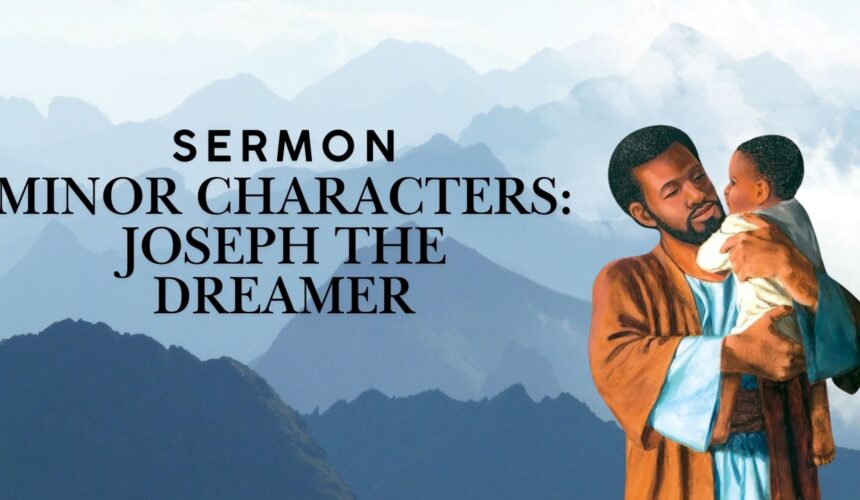December 1, 2024
Matthew 1:18 – 25
Do you ever think about how we depend on other people, usually without realizing it or even knowing them? I arrived at church today because for the most part, everybody on the road this morning as I drove over here was obeying traffic laws. (There was that one guy who ran through the stoplight after it changed, but I guess we’ve all kind of come to expect that. I am a little hazy about why he would need to do that before 7:00 on a Sunday morning, but hey, who am I to judge?) Point is, things did not have to go the way they did for me this morning. If one person had decided to look at his or her phone at the wrong time while driving down Colorado Boulevard, I might not be here this morning. I depend on those other drivers, even though I’ll probably never meet them.
Or here’s another example: just in November alone, there were two major food recalls. One company recalled more than 36 tons of prepared chicken products, like chicken nuggets, stuff like that. (I’m still trying to wrap my mind around the idea of 36 tons of chicken nuggets. It’s a lot.) Another company recalled more than 80 tons of ground beef. And don’t even get me started on the 30,000 contaminated chocolate waffle cones that had to go back to the waffle cone factory in October. I didn’t even know there was such a thing as a waffle cone factory, and this week I learned one of them could have killed me. But you know what I didn’t learn? I did not learn the names of the food inspectors who saved us all from potentially fatal food poisoning. So thanks, food inspection person, whoever you are. Our stories might be a lot shorter without you.
Of course, we depend on each other for more than just staying alive, although that’s pretty important. Remember during the COVID pandemic, when some occupations were declared essential? These were not the most glamorous or appealing jobs. They were just occupations the rest of us really needed: medical professionals, workers in the energy and utilities sector who kept our lights on and our water running, child care staff, basic trades like home and auto repair; transportation workers; there were lots of others. Those people were essential not because they were famous, or because they commanded high pay and prestige. They were essential because without them society would pretty much grind to a halt.
There are lots of other examples, but my point is simple: we depend on each other. People who may not know our names, people we will never know or meet depend on each one of us, every day. They need us to show up and pay attention to the small roles we have in their lives, and we need them in the same way.
I think this basic truth shows up in the Bible, in kind of an interesting way. Repeatedly in scripture, there are moments where the whole story of what God is doing hinges on the actions of some minor character who may not have any idea of the role they’re playing.
At the beginning of the Biblical Book of Exodus, we’re told that Pharoah, the most powerful ruler in the known world, issues a genocidal order to kill all Israelite children. And two brave women, whose names are Shiphrah and Puah, refuse to carry out Pharoah’s command. Their role is absolutely decisive. They allow the story of God’s people to continue. But they’re only mentioned by name one time, and the whole episode takes up six verses. That’s it. They’re never heard from again, but without them, the people of God might not have survived.
Later in Exodus, when Moses is born, his mother puts him in a small floating basket in the river Nile, hoping someone will find him and raise him. He’s rescued by Pharoah’s daughter. Without her, the story could not have continued. But she only shows up for five verses in the entire Bible. And we never even learn her name.
Even though the culture that recorded these ancient Biblical tales was strongly patriarchal, at critical moments the story hinges on the actions of women – Abraham’s wife Sarah, for example, or Esther in the book that’s named after her.
It happens throughout scripture, just as it does in our lives now: the story depends on people we often know little or nothing about. But without them, there would be no story. Without them, our faith might not exist. Maybe we wouldn’t be sitting here, in a church, today. There might not be a church here to sit inΩ
I think the other important feature of these stories is that these almost anonymous people who move things forward don’t know that so much depends on them. They’re just doing what they do, responding to the moment as best they can. And through them, God continues the work of bringing all creation in line with its intended purpose.
I say all this because most of us are not well known or influential by normal standards. But I think one of the conclusions we can draw from this repeated theme in the Bible is that in some utterly mundane and nondramatic way, any one of us could be pivotal to what God is doing in the world, and we might never know it. It’s hard to see the big picture of how we fit into God’s story. But who knows? Maybe it hinges on our just showing up, being faithful to God, being faithful to ourselves, and trusting that God will make a way even if we never see it
So for today and the next three weeks during the season of Advent, I want to focus on some of the minor characters in the story of Jesus’ birth. You’ve probably at least heard their names, because these are some of the most famous stories in the Bible. But I think it’s worth asking: what do they do to respond faithfully, even when they can’t see the big picture? I hope their stories can teach us something about how we’re called to live, even when we can’t see the outcome of our actions, which, let’s face it, is most of the time.
One of my favorite characters of this kind is Joseph, the man who takes on the responsibility of raising Jesus as his own son. We know almost nothing about him. He doesn’t appear at all in the gospel of Mark. He’s barely mentioned in the Gospel of John. In the Gospels of Matthew and Luke, he does appear briefly. Luke calls him “the father of Jesus.” There’s a passage in the 13th chapter of Matthew that calls Jesus “the carpenter’s son,” but that’s actually kind of a mistranslation. The Greek word translated “carpenter” there actually just means something like “craftsman” or “builder.” So we don’t know exactly what he did, but he worked with his hands. We don’t know how old he was when Jesus was born, or any details about his family of origin. Both Matthew and Luke say that he is a descendant of King David. And that’s about all we know.
But as happens so often in scripture, even though he’s not mentioned in more than a few verses, Joseph is crucial to the plot. In the reading we heard today, he and Mary are engaged when she becomes pregnant. In that first century Mediterranean culture, a woman pregnant outside of marriage was an embarrassment to her family. But more than that, she was in danger. She could be ostracized, forced out of her home and reduced to begging on the street, or even stoned to death for bringing shame on her family – which is incredibly unjust, because it’s not like she would be the only person involved. But Matthew calls Joseph a righteous man, because he’s about to do the decent, honorable thing: he’ll call off the marriage, but do it quietly. One of the scholars I read this week as I prepared this sermon said Joseph is righteous not only because he minimizes Mary’s risk; but also because he gives the biological father a chance to step up and do the right thing by marrying her.
But then Joseph has a dream of an angel, a messenger of God, who tells him he should go ahead with the wedding. And Matthew tells us that when he wakes up, he does.
It’s funny: in a way, the whole situation is not that unusual, at least not before Joseph’s dramatic dream. Women are pregnant outside of marriage all the time, and always have been. This is not a new thing, just like paternity disputes are not a new thing. But I think what makes Joseph such an important character for us is that he is faced with a choice. He can do the decent, socially acceptable, respectable, socially approved thing by breaking the engagement, protecting Mary, moving on with his life. He’ll even be respected and praised for the way he did it.
But instead, Joseph goes a step further. He chooses to go through with the wedding and raise Mary’s child as his own. In the small village society in which he lived, that means that there will be repercussions. But he swallows his pride. He exposes himself to the rumors and mockery and innuendo that would go with his decision. Faced with a choice between following proper behavior and following God, Joseph chooses God
Most of us are not going to find ourselves in Joseph’s situation, although it’s possible. Some of us may. But the kind of choice he faces is one we might face anytime. Will we choose the proper action, the socially acceptable and decent thing, that earns us respect and praise? Or will we take a risk for the Kingdom of God?
These are not easy choices. But I do think there’s good news here. Showing up, being faithful to the best of our ability day after day, we have a chance of moving God’s story forward in ways we don’t need to know about and may not ever realize.
Let’s take a few moments of silence.


